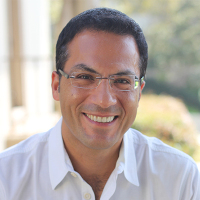个人简介
Siavash K. Kurdistani, MD, is a Professor in the Department of Biological Chemistry with a secondary appointment in the Department of Pathology and Laboratory Medicine. He is the Co-Director of the UCLA-Caltech MSTP program, a combined MD and PhD training track for students seeking to become physician-scientists. Dr. Kurdistani is also the Associate Director of the Gene Regulation Program Area within the Jonsson Comprehensive Cancer Center. He is also a member of the Eli and Edythe Broad Center of Regenerative Medicine and Stem Cell Research. Dr. Kurdistani received his B.S. degree in Biochemistry from UCLA in 1994 and his M.D. from Harvard Medical School in 1999. As an undergrad, Dr. Kurdistani worked in the field of Host-Guest Chemistry in the laboratory of Dr. Don Cram, 1987 Nobel Laureate in Chemistry. In medical school, Dr. Kurdistani received an HHMI Medical Student Fellowship to conduct research in the laboratory of Dr. Sam W. Lee. After a short residency in Pathology and Laboratory Medicine at UCLA, Dr. Kurdistani joined the laboratory of Dr. Michael Grunstein at UCLA for postdoctoral training and received the UCLA Chancellor's Award for Postdoctoral Fellows. He joined the faculty at UCLA in 2004.
研究领域
The cancerous cellular state is associated with multiple chromatin alterations, but elucidating the precise order of such alterations during tumorigenesis and their contributions to the clinical progression of the disease remain significant challenges in cancer biology. Our laboratory seeks to understand how histones and their post-translational modifications contribute to cancer initiation and progression. Our approach is twofold: 1) we identify alterations of the epigenome that are related to the cancer’s clinical behavior directly from primary cancer tissues and pursue the biological bases of these alterations in the laboratory through reductionist approaches using model systems; 2) we exploit the ability of DNA tumor viruses to transform normal human cells to cancerous ones to determine the early epigenetic alterations that may drive cancer initiation. Our two-pronged strategy has provided an important advantage: recognition of novel phenomena that are not readily discernable from the current paradigms for the function of histone modifications. Pursuit of these phenomena has led to unanticipated biological discoveries about the function of chromatin and its alterations in cancer. These findings include the first predictive association of epigenetic alterations with clinical outcome of cancer patients, discovery of an unusual function of histones in regulation of intracellular pH, identification of a unique histone acetylation site as a critical target for oncogenic transformation by viral oncogenes, and uncovering an evolutionary function of the core histones for genome compaction that may also explain certain histones are mutated in cancer.
近期论文
 查看导师最新文章
(温馨提示:请注意重名现象,建议点开原文通过作者单位确认)
查看导师最新文章
(温馨提示:请注意重名现象,建议点开原文通过作者单位确认)
Nguyen AH, Elliott IA, Wu N, Matsumura C, Vogelauer M, Attar N, Dann A, Ghukasyan R, Toste PA, Patel SG, Williams JL, Li L, Dawson DW, Radu C, Kurdistani SK, Donahue TR. Histone deacetylase inhibitors provoke a tumor supportive phenotype in pancreatic cancer associated fibroblasts. Oncotarget. 2016 Nov 24.
Attar N, Kurdistani SK. Exploitation of EP300 and CREBBP Lysine Acetyltransferases by Cancer. Cold Spring Harb Perspect Med. 2016 Nov 23.
Wang W, Org T, Montel-Hagen A, Pioli PD, Duan D, Israely E, Malkin D, Su T, Flach J, Kurdistani SK, Schiestl RH, Mikkola HK. MEF2C protects bone marrow B-lymphoid progenitors during stress haematopoiesis. Nat Commun. 2016 Aug 10;7:12376.
Monte E, Rosa-Garrido M, Karbassi E, Chen H, Lopez R, Rau CD, Wang J, Nelson SF, Wu Y, Stefani E, Lusis AJ, Wang Y, Kurdistani SK, Franklin S, Vondriska TM. Reciprocal Regulation of the Cardiac Epigenome by Chromatin Structural Proteins HMGB and CTCF: Implications for Transcriptional Regulation. J Biol Chem. 2016 May 16.
Hong CS, Graham NA, Gu W, Espindola Camacho C, Mah V, Maresh EL, Alavi M, Bagryanova L, Krotee PA, Gardner BK, Behbahan IS, Horvath S, Chia D, Mellinghoff IK, Hurvitz SA, Dubinett SM, Critchlow SE, Kurdistani SK, Goodglick L, Braas D, Graeber TG, Christofk HR. MCT1 modulates cancer cell pyruvate export and growth of tumors that co-express MCT1 and MCT4. Cell Rep. 2016 Feb 23;14(7):1590-601.
Pradhan SK, Su T, Yen L, Jacquet K, Huang C, Côté J, Kurdistani SK, Carey MF. EP400 Deposits H3.3 into Promoters and Enhancers during Gene Activation. Mol Cell. 2016 Jan 7;61(1):27-38.




 京公网安备 11010802027423号
京公网安备 11010802027423号